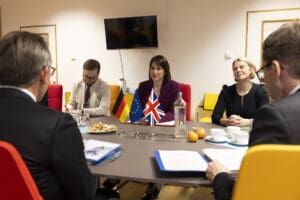
Chancellor Rachel Reeves is set to call for a “reset” in Britain’s economic relationship with the European Union, arguing that closer ties would help break down barriers to trade and enhance both sides’ growth prospects.
In the first address by a British chancellor to the Eurogroup since Brexit, Reeves will say that while the UK is not seeking to re-join the trade bloc, forging a “mature, business-like relationship” is in the shared interest of both Britain and the EU.
Acknowledging that recent years have been fraught, Reeves will tell European finance ministers in Brussels: “Division and chaos defined the last government’s approach to Europe. It will not define ours.” Although Labour has pledged to respect the UK’s decision to leave the single market and customs union, the chancellor’s appeal points towards easing paperwork burdens, reducing export barriers, and seeking a veterinary agreement to facilitate smoother food and farm trade.
The push comes as Britain’s exporters struggle with red tape in the wake of Brexit, and as global trade risks intensify following President-elect Donald Trump’s threats of tariffs as high as 20 per cent on imported goods. The British Chambers of Commerce echoed Reeves’s sentiment, warning that, to grow, the UK “must export more” but that firms are “struggling under huge regulatory and paperwork burdens.”
Yet any further alignment with EU standards may face political pushback, with the Conservatives criticising Reeves for focusing on Europe rather than prioritising a transatlantic trade deal with the incoming US administration. Meanwhile, the EU may seek concessions of its own, such as improved opportunities for young Europeans to live and work in Britain—an arrangement Labour leader Sir Keir Starmer has previously ruled out.
Reeves’s intervention aligns with recent comments from Andrew Bailey, Governor of the Bank of England, who said Britain should seize “opportunities to rebuild relations” with the EU, and from analysts warning that any US shift towards protectionism could pose a serious threat to European exporters. Carsten Brzeski, global head of ING Research, noted that potential US tariffs and deregulation could “cannibalise” Europe’s growth potential, making constructive UK-EU engagement more vital than ever.
By promising to work constructively with the European bloc, Reeves aims to reassure investors and businesses that Britain’s economic future will not be defined by fractious negotiations or entrenched isolation. Instead, she intends to show that cooperation, rather than confrontation, can strengthen Britain’s standing and resilience amid uncertain global trading conditions.
Read more:
Reeves calls for ‘reset’ with EU to spur UK growth amid global trade tensions





